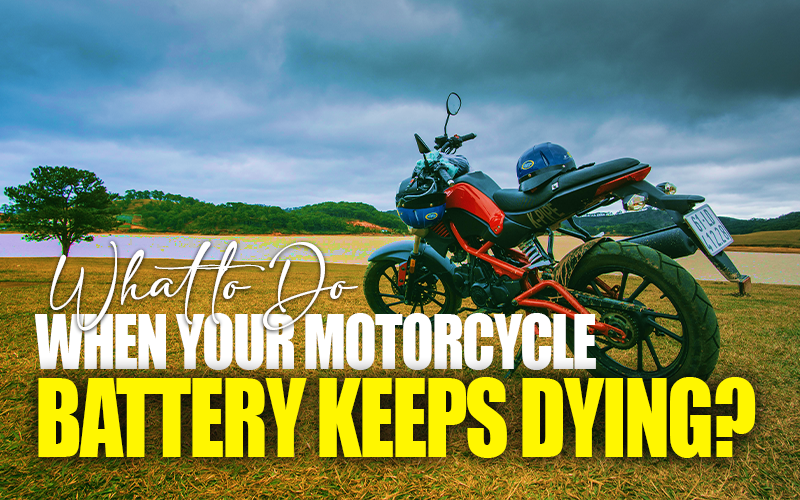
-
By Jenson Castillo

We’ve all been there. You’re ready for a ride, gear on, helmet strapped, key turned—and nothing happens. No hum from the engine, no lights, just silence. Your motorcycle battery has given up again, leaving you stuck. Frustrating, right?

But don’t worry! In this guide, we’ll take you through what to do when your motorcycle battery keeps dying, so you can get back on the road without the headache.
Just like all things, motorcycle batteries have a lifespan. If your battery is over 2-3 years old, it might be time for a replacement. Most motorcycle batteries are designed to last about this long, depending on the type and how well they’ve been maintained. Check your battery’s age first, as this could be the most straightforward solution.
Tip: If the battery is close to or past its expected life, replace it with a fresh one to avoid future problems.
Your battery might not be the problem. Sometimes, it’s the charging system that’s not working properly. Your bike’s charging system is responsible for keeping the battery juiced up while you’re riding. If there’s an issue, your battery will slowly drain, even while you’re on the move.
Here’s what you can do:
Tip: If you don’t feel comfortable checking this yourself, take your bike to a mechanic for a full check-up.
Is something draining the battery even when the bike is off? Electrical issues, like a faulty accessory or a short circuit, can cause your battery to die overnight. Inspect your bike for any aftermarket add-ons like heated grips, lights, or alarms that could be pulling power from the battery even when the engine is off.
Here’s how to check for a power drain:
Tip: Disconnect one electrical accessory at a time and test the current draw again to find the culprit.
Sometimes, the issue is as simple as dirty or loose battery connections. Corroded or loose terminals can stop the battery from charging properly, leading to frequent battery failures. Check both the positive and negative terminals for any corrosion or loose connections.
Here’s what you can do:
Tip: After cleaning, apply a little dielectric grease to the terminals to prevent future corrosion.
If none of the above steps reveal the problem, your battery might just be faulty. Even newer batteries can sometimes have issues. Take the battery out of the bike and have it tested at a local auto or bike shop. Many places will test it for free or a small fee.
Tip: If your battery fails the test, replacing it is the best option.
Once you’ve fixed or replaced the battery, you’ll want to keep it in good shape. Here are some tips for battery maintenance:
A dying motorcycle battery is a hassle, but with the right steps, you can figure out what’s wrong and prevent it from happening again. Whether it’s replacing an old battery, checking for power drains, or cleaning the terminals, these steps will help keep your bike ready for the next ride.
Take care of your battery, and it will take care of you. With a little maintenance and attention, you’ll be back on the road in no time, free from the worry of a dead battery.
Share :
Subscribe to our fortnightly newsletter with stories from our latest adventures and the best travel tips